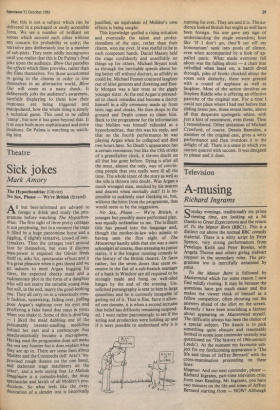Theatre
Sick jokes
Mark Amory
The Hypochondriac (Olivier) No Sex, Please — We're British (Strand) All but best-informed are advised to forego a drink and study the programme before watching The Hypochondriac. The first sight of three pretty cottages is not perplexing, but in a moment the stage is filled by a huge pantomime horse and a Jiggling, if slightly tentative, crowd of merrymakers. Then the cottages twirl around (not by themselves, but even if discreet man-power is required the Olivier lends itself to, asks for, spectacular effects and it is a great pleasure when it gets them) and we 80 indoors to meet Argan hugging his cures, the expected cheeky maid and a rudimentary plot in the form of a daughter Who will not marry the suitable young man but will, in the end, marry the good-looking one. They all carry on in a relentlessly comic fashion, squawking, falling over, pulling Poor Argan's nightcap over his eyes and Proffering a false hand that stays in yours When you shake it. Some of this is diverting — I liked the maid dabbing one of the Presumably sweeter-smelling medicines behind her ears and a stethoscope that anachronistically became a microphone. Having read the programme does not make the rest any funnier but it does explain what they are up to. There are some lines about Moliere and the Commedia dell' Arte's 'improvised rough theatre on the one hand, and elaborate stage machinery on the Other', and a note saying that Le Malade itnaginaire is a comedie-ballet, the most Spectacular and lavish of all Moliere's productions. So what feels like the overdecoration of a slender text is historically justified, an equivalent of Moliere's own effects is being sought.
This knowledge quelled a rising irritation and eventually the talent and professionalism of the cast, rather than their charm, won me over. It was restful to be in such competent hands. Daniel Massey held the stage confidently and unselfishly set things up for others. Michael Bryant took us through the inevitable speech about being better off without doctors, as affably as could be. Michael Fenner conjured laughter out of idiot gestures and clowning and Emily Morgan was a late treat as the giggly younger sister. At the end Argan is persuaded to chuck remedies and become a doctor himself in a silly ceremony made up from latin tags and cloaks. He then drops to the ground and Death comes to claim him. Back to the programme for the information that Moliere was himself ridiculed as a hypochondriac, that this was his reply, and that on the fourth performance he was playing Argan when he collapsed and died two hours later. So Death's appearance has a certain resonance; but like the 13th stroke of a grandfather clock, it throws doubt on all that has gone before. Dying is after all the most, almost the only, way of convincing people that you really were ill all the time. The whole tenor of the story as well as the title is thrown into doubt. Was Argan a much wronged man, mocked by his nearest and dearest when mortally sick? It is impossible to suddenly start thinking so, but, without the hints from the programme, that would seem to be the suggestion.
No Sex, Please — We're British, a younger but possibly more performed play, was equally unfamiliar to me. The brilliant title has passed into the language and, though the mother-in-law who admits to having seen the first night of The Mousetrap hastily adds that she was a mere schoolgirl of course, thus stressing its junior status, it is the longest running comedy in the history of the British theatre. Or farce rather, for the seven doors that seem excessive in the flat of a sub-branch manager of a bank in Windsor are all required to be strongly made and hung on well-oiled hinges by the end of the evening. Unsolicited pornography is sent to him in large quantities and he is curiously incapable of getting rid of it That is fine, farce is allowed one donnee, it is when a second intrudes that belief has difficulty remaining suspended. I went rather patronisingly to see if the acting and production were holding up and if it were possible to understand why it is running for ever. They are and it is. The audience looked British but might as well have been foreign. No one gave any sign of understanding the single entendres; lines like 'If I don't go, they'll cut off my honorarium' sank into pools of silence, even when accompanied by a look of appalled panic. What made everyone fall about was the falling about — a chair that swivelled when leant on, a hatch dived through, piles of books chucked about the room with dexterity, these were greeted with a round of applause as well as laughter. Most of the action devolves on Stephen Riddle who is offering an effective pastiche of the original star. For a time I could not place where I had met before that sliding lower jaw, those errant limbs, above all that desperate apologetic whine, with just a hint of resentment, even threat. Then I remembered. Other imitations of Michael Crawford, of course. Dennis Ramsden, a member of the original cast, gives a witty performance and then overdoes it to the delight of all. There is a sense in which you cannot quarrel with success. It was designed to please and it does.






































 Previous page
Previous page